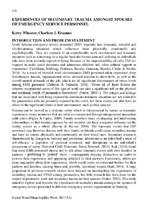| dc.description.abstract | South African emergency service personnel (ESP) regularly face traumatic, stressful and life-threatening situations which influences them physically, emotionally and psychologically. They are exposed to an unpredictable work environment and traumatic situations such as witnessing on a regular basis the human pain and suffering of individuals who have been seriously injured or dying. Because of the unpredictability of calls, ESP are required to make quick decisions and administer effective aid, often without support or reassurance (Fjeldheim, Nöthling, Pretorius, Basson, Ganasen, Heneke, Cloete & Seedat, 2014). As a result of stressful work circumstances EMS personnel often experience sleep disturbances, trauma, organisational stress, stressed reaction to alarm bells, as well as the overall mental demands of the job, which are all significant determinants of stress levels among EMS personnel (Calhoun & Tedeschi, 2006). “Given all of these factors, the inherent occupational stress of this type of work can take a significant toll on the physical and emotional health of paramedics themselves” (Porter, 2008:1). The images and feelings that are associated with being exposed to continuous traumatic situations are not limited to the paramedics who are primarily exposed to the event, but these events can also have an effect on the significant others in their environment, such as their spouses. | en_US |

